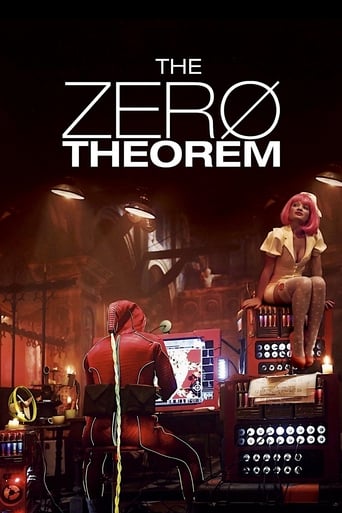Nothing is Everything
"The Zero Theorem," a 2013 cinematic gem produced by Le Pacte and Zanuck Independent, transports viewers to a dystopian future where the protagonist, Qohen Leth, portrayed by the enigmatic Christoph Waltz, grapples with existential dread and the search for meaning. Directed by the visionary Terry Gilliam, the film unfolds in a visually arresting world that blends elements of cyberpunk and surrealism, creating an atmosphere that is both unsettling and mesmerizing. Qohen, a reclusive computer programmer, is tasked with solving the titular Zero Theorem, a mathematical equation that purportedly proves the ultimate futility of life. As he delves deeper into his work, the boundaries between reality and illusion blur, leading him on a journey of self-discovery and rebellion against the oppressive forces that seek to control him. The film's narrative is enriched by a stellar supporting cast, including the likes of Mélanie Thierry, David Thewlis, and Tilda Swinton, each bringing their unique flair to the screen. Mélanie Thierry's portrayal of Bainsley, a vivacious cam-girl who becomes Qohen's love interest, injects a glimmer of hope and human connection into the otherwise bleak landscape. David Thewlis, as Qohen's supervisor, embodies the corporate machinations that drive the protagonist's isolation, while Tilda Swinton's brief but impactful appearance as the enigmatic Dr. Shrink adds layers of psychological complexity to the story. Together, these performances weave a tapestry of human emotion and societal critique that resonates long after the credits roll. Terry Gilliam's directorial style is on full display in "The Zero Theorem," with his signature blend of dark humor and visual extravagance creating a film that is as thought-provoking as it is entertaining. The production design, a chaotic amalgamation of futuristic technology and decaying urban landscapes, serves as a constant reminder of the film's thematic concerns about the dehumanizing effects of modern society. The use of vibrant colors and intricate set pieces, such as Qohen's dilapidated church-turned-home, further enhances the film's immersive quality, drawing viewers into its world with every frame. Gilliam's ability to balance the film's philosophical undertones with moments of levity ensures that "The Zero Theorem" remains engaging from start to finish. In the end, "The Zero Theorem" stands as a testament to the power of cinema to explore profound existential questions while delivering a visually stunning and emotionally resonant experience. The film's exploration of themes such as isolation, the search for meaning, and the impact of technology on human life is as relevant today as it was upon its release. Through Qohen's journey, viewers are invited to reflect on their own lives and the forces that shape them, making "The Zero Theorem" not just a film, but a mirror held up to the human condition.
年2013
ホームページ
予算8500000$
上映時間107 分
収益770706$
ジャンルドラマファンタジーサイエンスフィクション
製作国FranceRomaniaUnited KingdomUnited States of America

